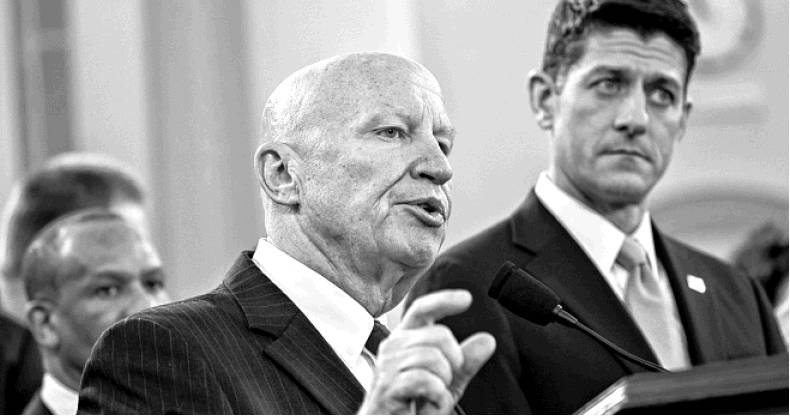Tax plan is caffeine but U.S. needs protein
CHRIS TOMLINSON Commentary
The Republican corporate tax plan will juice the economy, but without investments in infrastructure, the effect on America will be more akin to an energy drink than a protein shake.
The Tax Cuts and Jobs Act slashes the corporate tax rate to 20 percent, with partnerships, limited liability companies and other pass-through businesses taxed at 25 percent. This will be good for many businesses, but will not deliver a long-term economic boost.
Well-designed changes in the tax code can encourage businesses to spend money in ways that boost economic growth. But that’s only if the increase in private spending is larger than the corresponding reduction in government spending. Too often, people forget that a government dollar stimulates the economy just as well as a private-sector dollar.
Simple tax cuts often supply only a short-term high because they do not generate spending on real things, like new factories, jobs and homes. Studies show similar GOP tax cuts in 1981, 2001 and 2003 failed to deliver.
The 1983-84 economic boom did not come from former President Ronald Reagan’s tax cuts, but was due to the Federal Reserve slashing interest rates from 20 percent in 1980 to 9.5 percent in 1982, according to a peer-reviewed analysis by Reagan’s former chief economist, Martin Feldstein, and Harvard University economist Douglas Elmendorf.
“The timing of the expansion and the composition of the real output changes make it clear that the primary cause of increased output was the shift to a more expansionary monetary policy that occurred in 1982,” the authors conclude. “We also find no support for the proposition that the recovery reflected an increase in the supply of labor induced by the reduction in personal tax rates.”
The 1983-84 economic boom did not come from Ronald Reagan’s tax cuts, but was due to the Fed slashing interest rates ...
GOP leaders say the tax cuts will encourage companies to invest in research and development, new equipment and more workers. But U.S. corporations have been sitting on fat balance sheets for years, and none of those things have happened.
Many corporate boards would rather use any extra cash to raise dividends, or buy back stock, thereby rewarding investors with higher share prices. Spending cash on something new is risky, and since CEOs are often compensated with company stock, they prefer to take the safer route that generates more bonuses.
The GOP tax plan would allow companies to immediately deduct the expense of purchasing new equipment or investing in new facilities, and that should encourage investment. But it will not necessarily be in the United States.
One of the biggest changes to the corporate tax code is the adoption of a territorial system, similar to those used in other developed countries. Companies would pay taxes where the profits are earned, not in the country where the company is headquartered.
Currently, the IRS only taxes foreign profits when they are transferred into this country. That has led major U.S. corporations to leave $2.5 trillion in profits overseas accounts rather than investing them at home. Our so-called universal tax system has also led corporations to move their headquarters overseas.
A territorial system would allow corporations to bring profits home tax free, but also to deduct more from investments in overseas factories and jobs. To minimize abuse, the act would impose a 10 percent tax on “high-profit foreign subsidiaries,” but any good accountant will find a way around that.
More encouraging is a new 20 percent tax on payments that foreign-owned companies transfer overseas, which would eliminate the advantage of a foreign headquarters. Expect many U.S. companies domiciled in offshore tax havens to fight that provision.
What’s missing from the GOP equation, though, is spending on infrastructure, specifically the $1 trillion over 10 years that President Donald Trump promised on the campaign trail. If higher revenues from lower taxes is like drinking a double espresso, hiring people and companies to build real things is the protein shake America needs to build economic muscle.
Investing in new roads, bridges and new homes creates good middle class jobs that get people off of unemployment rolls and government health care programs. Construction jobs are the foundation of every nation’s economy, allowing young people to start families, buy houses and fill their homes with furniture, televisions and appliances.
The GOP’s current plan would hurt construction by limiting the mortgage interest and property tax deductions that encourage Americans to buy homes. The National Association of Home Builders and the National Association of Realtors are campaigning against the act until those limits are removed.
Americans deserve a smarter tax code that encourages domestic economic growth and meets our government’s needs. The GOP proposal has many good ideas, but the plan does nothing to address the nation’s infrastructure problems and fails to deliver long-term economic prosperity that would grow the middle class.
Americans deserve better, and Congress should spend the next few weeks whipping this plan into shape.
Chris Tomlinson is the Chronicle’s business columnist. chris.tomlinson@chron.com twitter.com/cltomlinsonwww.houstonchronicle.com/author/chris-tomlinson

